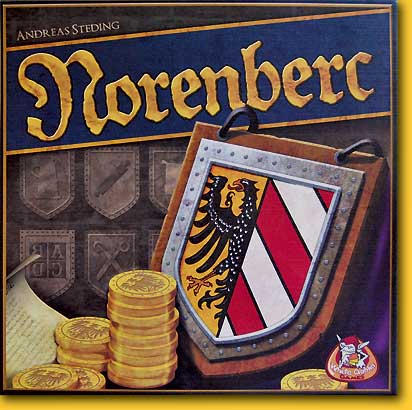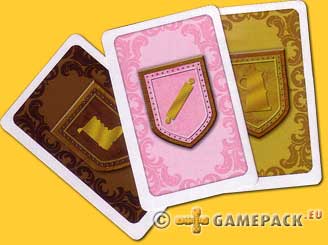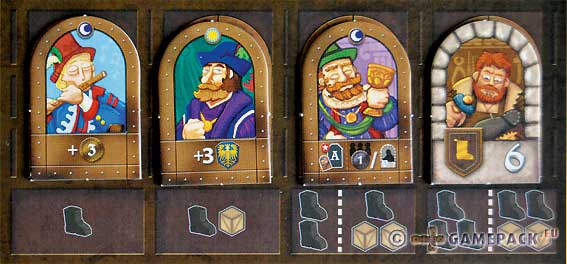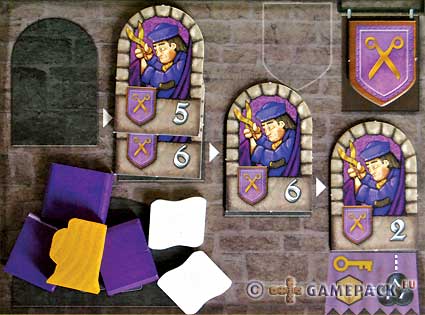Norenberc
Author: Andreas Steding
Publisher: White Goblin Games/Huch & Friends
Year: 2010
review by

| x |
|
|
|
|
|
|
|
|
|
|
|
|
|
|
|
|
|
|
|
|
|
|
|
|
|
|
|
|
|
|
|
|
|
|
|
|
|
|
|
|
|
|
|
|
|
|
|
|
|
|
 |
In the Middle Ages Norenberc was a thriving center of commerce with a number of very powerful guilds. Whoever wanted to achieve something in the city had to earn the favour of the guilds first. We therefore try to make ourselves popular with the guild members, first of all by buying their merchandise. But to make enough money to pursue this tactic we have to be a little bit creative, and sell the purchased goods at higher price, or invest them elsewhere. Whoever manages to become the guilds' most popular trader is the New Ruler of Norenberc, or just the winner of the game!
|
|
|
|
|
|
| x |
|
|
|
|
|
|
|
|
|
|
|
|
|
|
|
|
|
|
|
|
|
|
|
|
|
|
|
|
|
|
|
|
|
|
|
|
|
|
|
|
|
|
|
|
|
|
|
|
|
|
Depending on the number of players, three to six guild houses are used. In each guild house there is room for the goods supply, four guild masters: one for each round of the game, and for four guests on the first floor.
The players receive four agents and a set of guild cards. First, all players select any number of guild cards to indicate in which guild house they want to perform their actions this turn. Players reveal their cards simultaneously, and the guild houses are visited one by one. When multiple players have selected the same guild house, the turn order track decides who plays first. |
|
 |
|
|
|
|
|
| x |
|
|
|
|
|
|
|
|
|
|
|
|
|
|
|
|
|
|
|
|
|
|
|
|
|
|
|
|
|
|
|
|
|
|
|
|
|
|
|
|
|
|
|
|
|
|
|
|
|
|
 |
|
There are four different actions to choose from: purchase up to three goods for the price indicated on the guild master tile of the current round; sell goods for this price; recruit a guest; pass. In all cases the player places an agent on the roof of the guild house. This implies that a player can perform only as many actions as he has agents available! |
|
|
|
|
|
| x |
|
|
|
|
|
|
|
|
|
|
|
|
|
|
|
|
|
|
|
|
|
|
|
|
|
|
|
|
|
|
|
|
|
|
|
|
|
|
|
|
|
|
|
|
|
|
|
|
|
|
| The recruitment of a guest requires further explanation. The guests are a mixture of guild masters of all guilds, and townsmen. The costs of a guest, in goods, are indicated underneath the window of their room. The guild masters score points at the end of the game, and the townsmen give either an immediate advantage (such as an additional agent from the supply), or victory points at the end of the game. And there is more! When a player recruits a guest he immediately receives talers (money) equal to the number of agents present on the roof of the guild house. Additionally he may move his marker to the top of the turn order track! |
|
|
|
|
|
|
|
|
|
|
| x |
|
|
|
|
|
|
|
|
|
|
|
|
|
|
|
|
|
|
|
|
|
|
|
|
|
|
|
|
|
|
|
|
|
|
|
|
|
|
|
|
|
|
|
|
|
|
|
|
|
|
 |
|
|
|
|
|
|
|
| x |
|
|
|
|
|
|
|
|
|
|
|
|
|
|
|
|
|
|
|
|
|
|
|
|
|
|
|
|
|
|
|
|
|
|
|
|
|
|
|
|
|
|
|
|
|
|
|
|
|
|
| When all guild houses have been visited everybody takes all their guild house cards back: every single turn all cards are available to the players! This is repeated until all players have passed, usually because they ran out of agents. |
|
|
|
|
|
|
|
|
|
|
| x |
|
|
|
|
|
|
|
|
|
|
|
|
|
|
|
|
|
|
|
|
|
|
|
|
|
|
|
|
|
|
|
|
|
|
|
|
|
|
|
|
|
|
|
|
|
|
|
|
|
|
| Then, the guild masters choose their favourite! And they are very pragmatic: the player possessing the most goods of their guild is their favourite. As a reward the player receives the guild master tile and the guild crest (required for scoring at the end of the game). He has to return one of his goods to the supply as compensation. |
|
|
|
|
|
|
|
|
|
|
| x |
|
|
|
|
|
|
|
|
|
|
|
|
|
|
|
|
|
|
|
|
|
|
|
|
|
|
|
|
|
|
|
|
|
|
|
|
|
|
|
|
|
|
|
|
|
|
|
|
|
|
 |
|
When all guild houses have praised their favourite the preparations for the next round take place. The guild masters shift to the next position: in the next round a different guild master takes charge, and the number indicated on his card is the new market price for the goods. The guests move on to the cheaper locations on the left, and new guests enter from the right.
 |
|
|
|
|
|
| x |
|
|
|
|
|
|
|
|
|
|
|
|
|
|
|
|
|
|
|
|
|
|
|
|
|
|
|
|
|
|
|
|
|
|
|
|
|
|
|
|
|
|
|
|
|
|
|
|
|
|
| After the fourth round a victory points bonanza takes place to determine the winner: for each guild the value of the collected guild masters is added up, and the three players with the highest total receive points. Additionally there are points for players that have a total value of 30+ for one guild, for those who have one guild master of each guild house, for the richest player, for the collected crests, and for some of the townsmen. Provided that nobody has lost track of the score, the player with the highest total wins! |
|
|
|
|
|
| x |
|
|
|
|
|
|
|
|
|
|
|
|
|
|
|
|
|
|
|
|
|
|
|
|
|
|
|
|
|
|
|
|
|
|
|
|
|
|
|
|
|
|
|
|
|
|
|
|
|
|
 |
|
| x |
|
|
|
|
|
|
|
|
|
|
|
|
|
|
|
|
|
|
|
|
|
|
|
|
|
|
|
|
|
|
|
|
|
|
|
|
|
|
|
|
|
|
|
|
|
|
|
|
|
|
| x |
|
|
|
|
|
|
|
|
|
|
|
|
|
|
|
|
|
|
|
|
|
|
|
|
|
|
|
|
|
|
|
|
|
|
|
|
|
|
|
|
|
|
|
|
|
|
|
|
|
|
| x |
|
|
|
|
|
|
|
|
|
|
|
|
|
|
|
|
|
|
|
|
|
|
|
|
|
|
|
|
|
|
|
|
|
|
|
|
|
|
|
|
|
|
|
|
|
|
|
|
|
|
 |
|
|
|
|
|
|
|
|
|
|
|
|
|
|
|
|
|
|
|
|
|
|
|
|
|
|
|
|
|
|
|
|
|
|
|
|
|
|
|
|
|
|
|
|
|
|
|
Norenberc is a well-designed game; it contains beautiful wooden beer mugs, boots and hats, and the icons on the board and tiles are easy to understand. The rules are simple, but mind: this doesn't make Norenberc a simple game!
The various elements of the game fit together like a glove, resulting in very smooth gameplay. Despite this, the rounds become longer and more tedious towards the end of the game. This is partly caused by the fact that most players will have collected additional agents, which enables them to perform more actions. It is very advantageous to possess more agents than the other players: when the others have performed all their actions, the player with an additional agent has another turn. He can use this turn to buy goods in order to become the guild master's favourite without interruption by the other players. It is not easy to obtain extra agents, so the other players will not always be able to change this situation. If a player remains in this favourable position for too long, other players might not be able to catch up with him anymore.
|
|
 |
| x |
|
|
|
|
|
|
|
|
|
|
|
|
|
|
|
|
|
|
|
|
|
|
|
|
|
|
|
|
|
|
|
|
|
|
|
|
|
|
|
|
|
|
|
|
|
|
|
|
|
|
Another reason for the steadily increasing turn length is the fact that there are so many ways to score points that it is almost impossible to estimate during the game how everybody is doing, and in which areas additional effort is useful. This makes it difficult to find the right focus during the game, and often the winner of the game comes as a complete surprise. Despite this 'Norenberc' is an absolute must have!
© 2010 Barbara van Vugt
Norenberc, Andreas Steding, White Goblin Games/Huch & Friends, 2010 - 2 to 5 players, 12 years and up, 90 minutes
|
|
|
|
|
  |
|
|
|
|
|
|
|
|
|
|
|
|
|
|
|
|
|
|
|
|
|
|
|
|
|
|
|
|
|
|
|
|
|
|
|
|
|
|
|
|
|
|
|
|
|
|
  |
A rather dry efficiency game, despite its beautiful appearance |
|
|
|
|
|
|
  |
|
|
|
|
|
|
| x |
|
|
|
|
|
|
|
|
|
|
|
|
|
|
|
|
|
|
|
|
|
|
|
|
|
|
|
|
|
|
|
|
|
|
|
|
|
|
|
|
|
|
|
|
|
|
|
|
|
|
| x |
|
|
|
|
|
|
|
|
|
|
|
|
|
|
|
|
|
|
|
|
|
|
|
|
|
|
|
|
|
|
|
|
|
|
|
|
|
|
|
|
|
|
|
|
|
|
|
|
|
|
 |
|
|
|
|
|
|
|
|
|
|
|
|
|
|
|
|
|
|
|
|
|
|
|
|
|
|
|
|
|
|
|
|
|
|
|
|
|
|
|
|
|
|
|
|
|
|
 |
|
|
|
|
|
|
|
|
|
|
|
|
|
|
|
|
|
|
|
|
|
|
|
|
|
|
|
|
|
|
|
|
|
|
|
|
|
|
|
|
|
|
|
|
|
|
| x |
|
|
|
|
|
|
|
|
|
|
|
|
|
|
|
|
|
|
|
|
|
|
|
|
|
|
|
|
|
|
|
|
|
|
|
|
|
|
|
|
|
|
|
|
|
|
|
|
|
|
 |
|
|
|
|
|
|
|
|
|
|
|
|
|
|
|
|
|
|
|
|
|
|
|
|
|
|
|
|
|
|
|
|
|
|
|
|
|
|
 |
|
|
|
|
|
|
|
|
|
|
|
|
|
|
|
|
|
|
|
|
|
|
|
|
|
|
|
|
|
|
|
|
|
|
|
|
|
|
|
|